Peacemakers Network Engagement at the 79th Session of the United Nations General Assembly
Event | September 2024
Throughout the 79th session of the United Nations General Assembly, the Peacemakers Network and its partners held events showcasing religious and traditional contributions to the Pact for the Future and beyond, emphasizing holistic community development and whole-of-society inclusion efforts that reach from the grassroots to high-level forums.
Contents
Faith-Based Solutions for the Pact for the Future and Beyond
Youth and Faith: Shaping a New Paradigm for Climate Action
Youth Summit of the Future Action Days
Towards Transformative Peace: A Multi-Stakeholder Dialogue on Transformative Peace
A Beacon of Light in the Darkness: International Day of Peace High-Level Reception
Faith and the Future: What’s Next? High-Level Multi-Faith Reception
Faith-Based Solutions for the Pact for the Future and Beyond
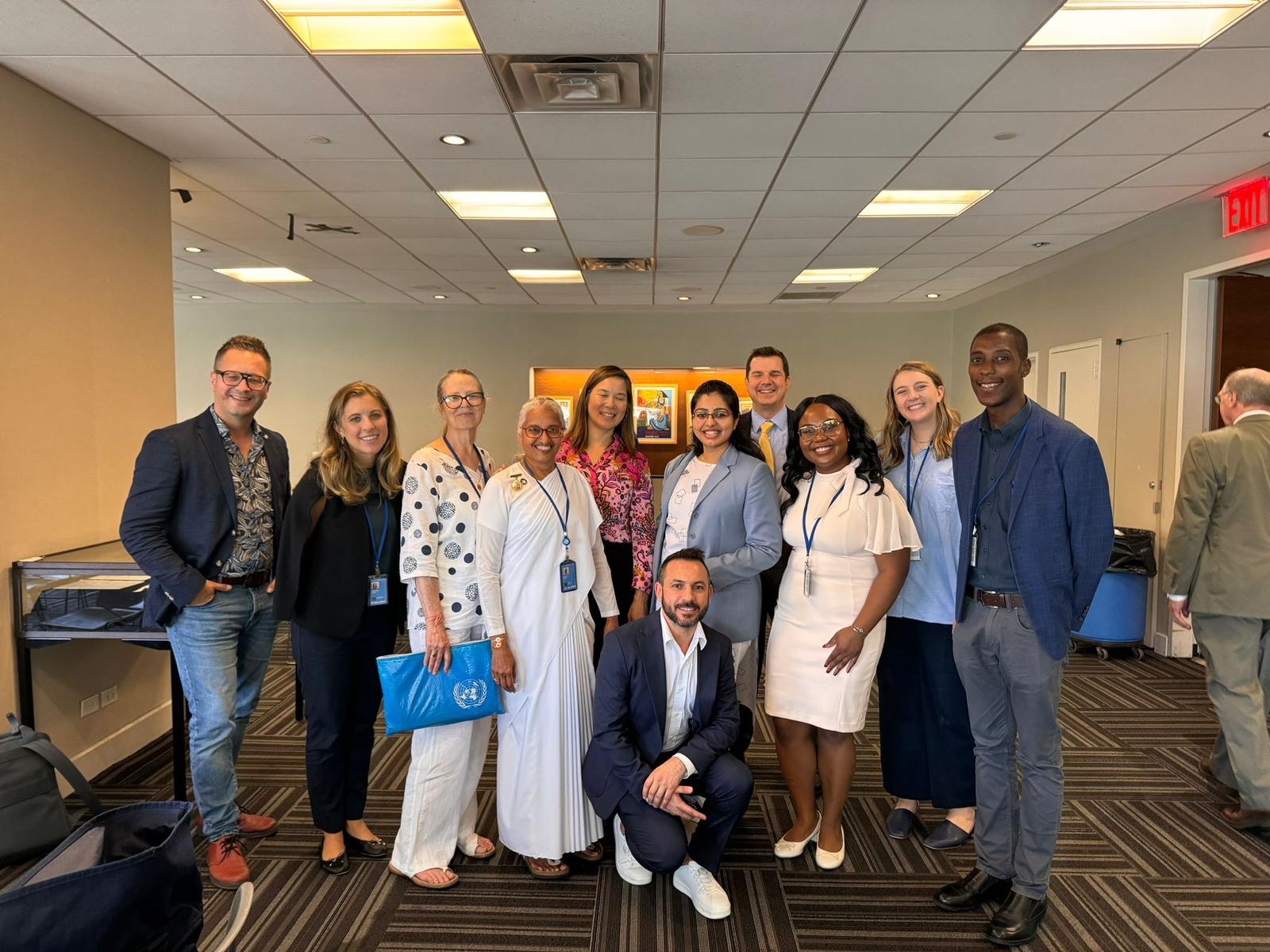
Organizers and participants of the imPACT Coalition side event.
On Friday, September 20th, the ImPACT Coalition on Faith-based Solutions held a Side Event to the Summit of the Future, co-sponsored by the UN Environment Programme (UNEP) and the UN Multi-faith Advisory Council (MFAC). In addition to the Peacemakers Network being highlighted as a member of both the ImPACT Coalition and the MFAC, a variety of Network members participated in the event including the United Nations Alliance of Civilizations (UNAOC)and the Global Interfaith Network (GIN-SSOGIE). The side event was a chance for faith actors to share insights, best practices, and actionable recommendations aligned with the Summit’s objectives, in support of a more equitable and sustainable future.
The event featured moderator Celine Bankumuhari, Head External Relations and Advocacy, Faith to Action Network and panelists: Dr. Husna Ahmad, CEO of Global One 2015, Jamil Ahmad, Director of Intergovernmental Affairs, New York Office, United Nations Environment Programme (UNEP), and Jessica Roland, Senior Inclusive Peace Specialist, Peacemakers Network.
Dr. Ahmad emphasized that, while the Pact recognizes the importance of intersectional work in the pursuit of inclusive just societies, faith communities are uniquely positioned to espouse those values, fostering greater trust and communication within the multilateral system. Jamil Ahmad further supported the role of faith-based organizations as key contributors and facilitators of action on the ground, and their distinct position to encourage their governments to action, making them valuable partners in environmental agreements. Jessica Roland discussed the Peacemakers Network’s ongoing work bolstering young people of faith to create better partnerships in the peacebuilding space and support capacity-building. Roland highlighted the value of interfaith dialogue in a multi-stakeholder environment and preluded the Summit’s Opening Ceremony with a rousing reminder that if,
“people of faith are the sound of civil society, young people are the drumbeat of that sound … they keep us going.”
The event closed with the presentation of the Joint Statement by the Faith-based Solutions ImPACT Coalition: “From Greed to Deeds– A Call to Action from the Faith Community to Global Leaders.” The Statement is advocating for an intersectoral approach in line with the Universal Declaration of Human Rights, urging leaders to take bold collective actions with a focus on trust, respect, tolerance, and peace. To read more, see the full statement linked here.
Youth and Faith: Shaping a New Paradigm for Climate Action
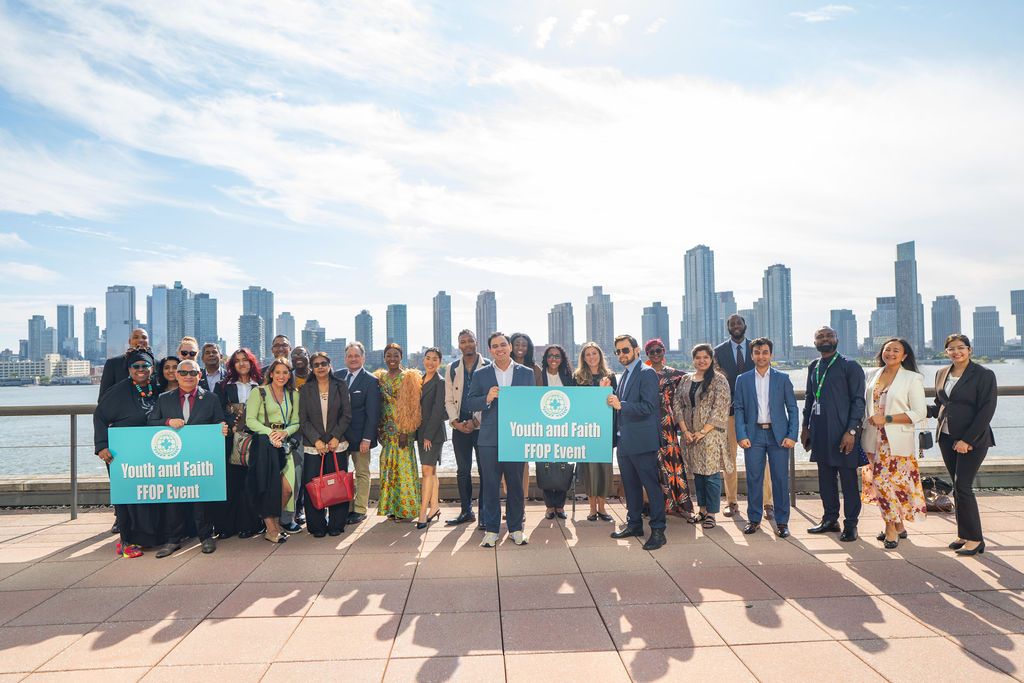
Participants for the Faith for Our Planet side event.
On September 21, 2024, Faith for Our Planet collaborated with the African Union, Governments of Antigua and Barbuda, Panama, and the Center of Media and Peace Initiatives to host a landmark event at the Summit of the Future at the United Nations Headquarters. The event brought together global leaders and youth advocates to discuss the critical intersection of faith and climate action.
The discussion highlighted the transformative potential of intergenerational cooperation in reshaping cultural values around climate change. Distinguished guests and speakers included Network Senior Specialist for Inclusive Peace, Jessica Roland, H.E. Molwyn Joseph, Minister of Health and Environment of Antigua and Barbuda, Juan Carlos Monterrey Gomez, National Climate Change Director, Panama and H.E Rohey John Manjang, Minister of Environment, Climate Change and the Natural Resources of the Republic of Gambia. Dr. Nafeez Ahmed delivered the keynote address, while Faith for Our Planet Advisory Board Member Nathalie Beasneal and Africa Director Joseph Hammond also spoke on how youth and faith leaders must rise to the challenge of the climate crisis.
Youth Summit of the Future Action Days
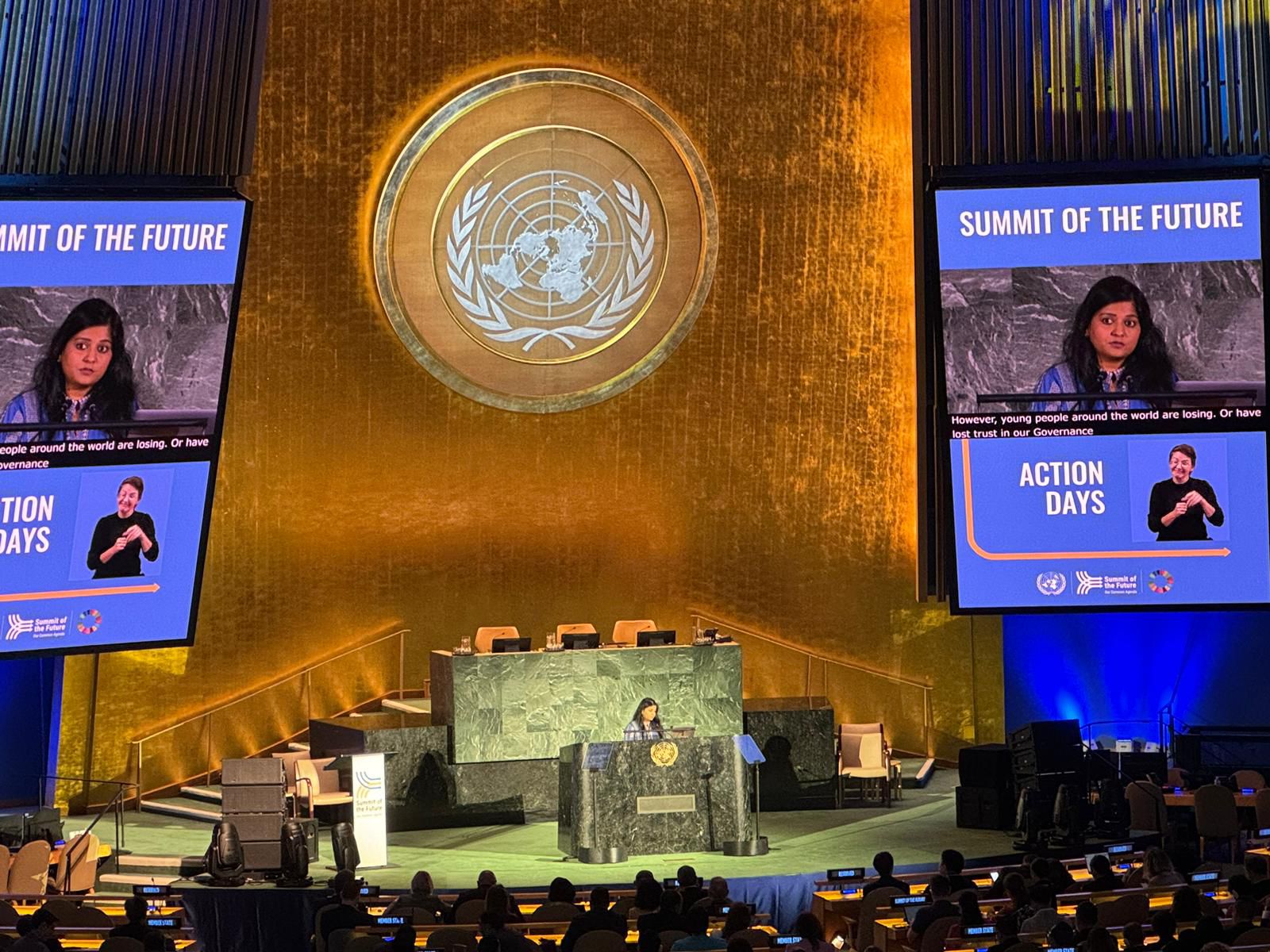
Network youth member Saumya Aggarwal speaking at the Opening Ceremony on Day 2 of the Youth Summit of the Future Action Days.
The Summit of the Future Action Days, convened by the Secretary-General of the United Nations on 20 and 21 September 2024 at United Nations Headquarters, were an opportunity to bring together representatives from Member States, civil society, private sector, academia, local and regional authorities, youth, and other voices, in shaping the Pact for the Future, its annexes, and its implementation. With an overarching dedication to future generations and three key areas of focus digital and technology, peace and security, and sustainable development and financing, the Action Days led the Summit with a call for inclusive transformative change in the United Nations and the greater multilateral system.
On Saturday, September 21st, Co-Founder of Youth for Peace International and Network member Saumya Aggarwal, spoke at the Action Day Opening Ceremony held in the UN General Assembly Hall. Aggarwal called for long-term transformative efforts, as “these spaces are only meaningful when we commit to make a shift and learn.” Aggarwal also outlined essential future areas of focus, including collaborating to support inclusivity for peaceful futures, addressing the prevalence of climate change effects on youth, and supporting a meaningful and safe digital future with youth inclusion in policy-making spaces.
The Ceremony highlighted many illustrious speakers, including António Guterres, Secretary-General of the United Nations, who stressed that the Pact should lay the groundwork for reform as young people undertake the most consultative process by the UN to date for the Pact for the Future, Digital Compact, and Declaration for Future Generations.
Towards Transformative Peace: A Multi-Stakeholder Dialogue on Transformative Peace
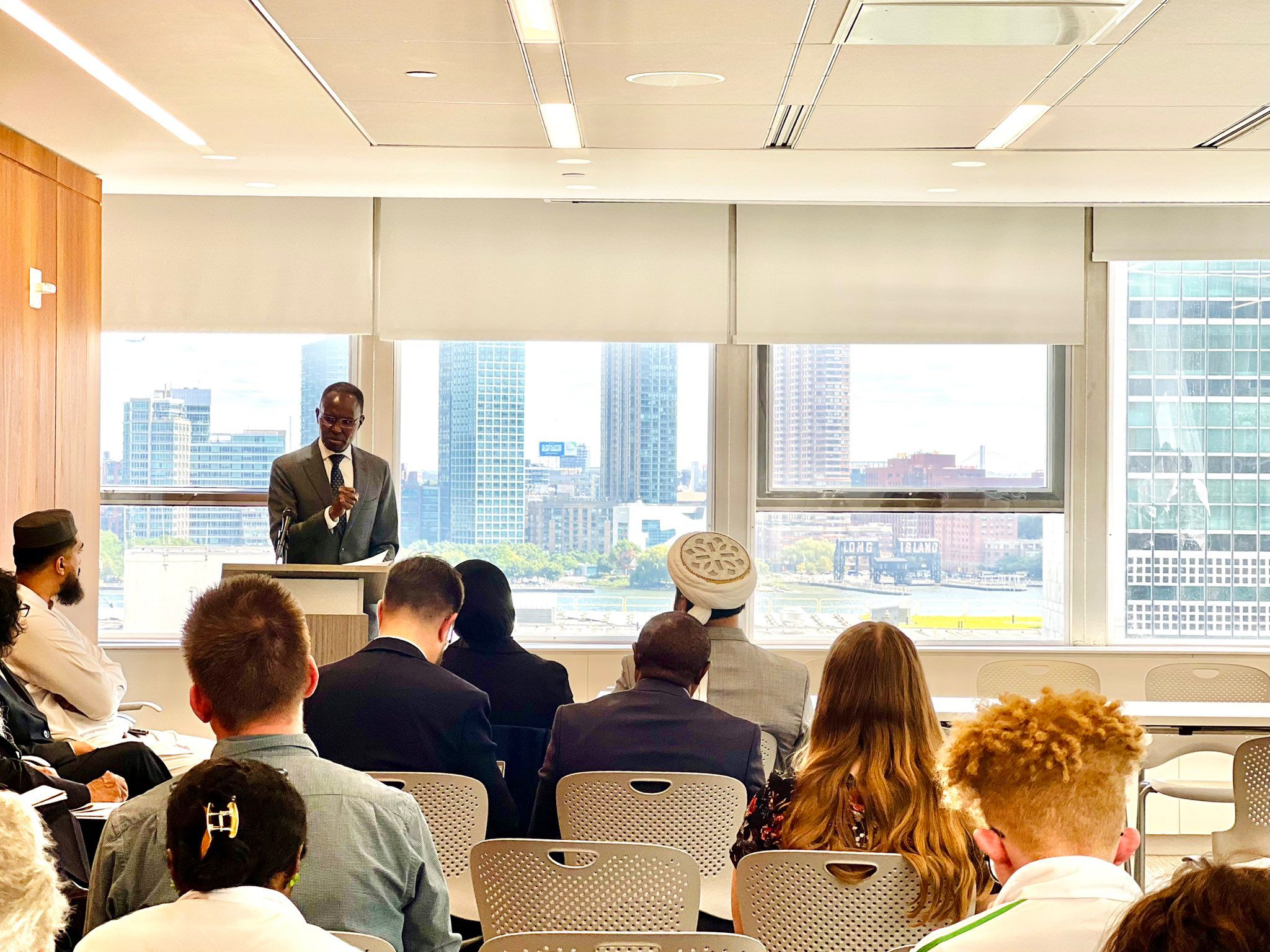
Peacemakers Network Executive Director Dr. Mohamed Elsanousi providing a keynote address. Photo: Religions for Peace.
On Saturday, September 21st, the Peacemakers Network, along with members of the Lutheran World Federation (LWF), Finn Church Aid (FCA), Religions for Peace (RfP), and other partners, participated in a multi-stakeholder dialogue on transformative peace alongside the Summit.
The event featured a keynote address from Dr. Mohamed Elsanousi, Executive Director of the Peacemakers Network, painting a stark image stating that, “technology and artificial intelligence are being increasingly weaponized… with devastating consequences for society.” Dr. Elsanousi supported that empathy and compassion are more important than ever, with religious actors playing a valuable role as insider mediators,
“using their [religious actors] influence to constructively transform the behavior and relationship of conflict actors.”
In closing, Dr. Elsanousi appreciated efforts to formalize the engagement of religious actors, such as the creation of the United Nations Interagency Task Force on Religion and Sustainable Development (IATF-Religion) and the Multi-faith Advisory Council (MFAC), but reiterated the need to ensure all values and beliefs are brought into the conversation in an inclusive manner.
Subsequently, Rev. Dr. Anne Burghardt, General Secretary of the Lutheran World Federation, emphasized the need to understand driving factors of conflict, focusing on grassroots participation and bottom-up implementation efforts with faith actors additionally contributing to transformative peace by promoting respect, solidarity, and “common humanity that unites us all”. Dr. Francis Kuria, Secretary-General for Religions for Peace, discussed the crucial role women play in narrative transformation and the importance of trauma healing in stopping cycles of conflict, calling for a dedication to improved dialogue and leadership. Rev. Khader El-Yateem, Executive Director of the Service and Justice home area of the Evangelical Lutheran Church in America (ELCA), further voiced the importance of actionable commitments and the “humanizing” role of religious actors as the Pact presents a critical opportunity to put peace at the center of the global agenda.
A Beacon of Light in the Darkness: International Day of Peace High-Level Reception
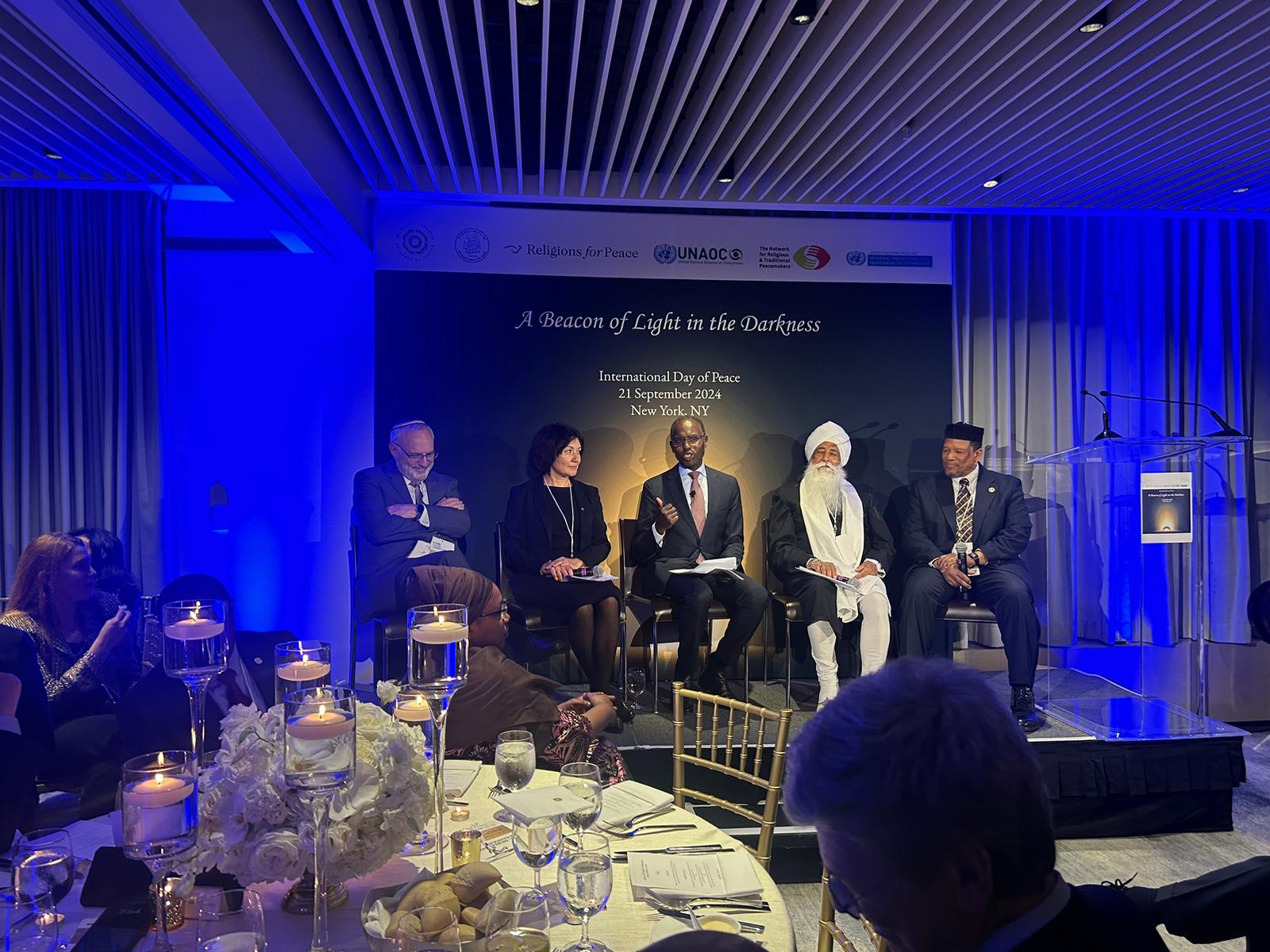
Peacemakers Network Executive Director Dr. Mohamed Elsanousi moderating the panel at the International Day of Peace High-Level Reception with [from left to right] Rabbi David Saperstein, Director Emeritus, Religious Action Center of Reform Judaism; Rev. Dr. Anne Burghardt, General Secretary, Lutheran World Federation; Professor Bhai Sahib Mohinder Singh Ahluwalia, Chairman, Guru Nanak Nishkam Sewak Jatha & Co-President, Religions for Peace; and Imam Dr. Talib M. Shareef, President, Masjid Muhammad, The Nation’s Mosque. Photo: Religions for Peace.
On Saturday, September 21st, the Peacemakers Network, along with the Abu Dhabi Forum for Peace, the United Nations Alliance of Civilizations, and the United Nations Office on Genocide Prevention and the Responsibility to Protect, organized a high-level reception in celebration of the International Day of Peace. Peacemakers Network Executive Director Dr. Mohamed Elsanousi served as Master of Ceremonies and Moderator, leading the coming together of esteemed ambassadors, dignitaries, eminent religious leaders, and people of faith in a moment of reflection alongside the Summit. Dr. Elsanousi underpinned the evening’s call for harmony and inclusion, stating that
“sustainable peace emerges from the ground up, thorough grassroots partnerships that foster inclusive dialogue and challenge the status quo. It is in these ongoing conversations, where every voice matters, that lasting change and collective harmony can be built.”
The event highlighted interfaith dialogue on the creation and implementation of the Pact, providing a unique opportunity to foster intersectional unity and collaboration in pursuit of a more hopeful future for all.
Reflections on the Interreligious Imperative for the Pact for the Future and the Multilateralism Based on Human Fraternity
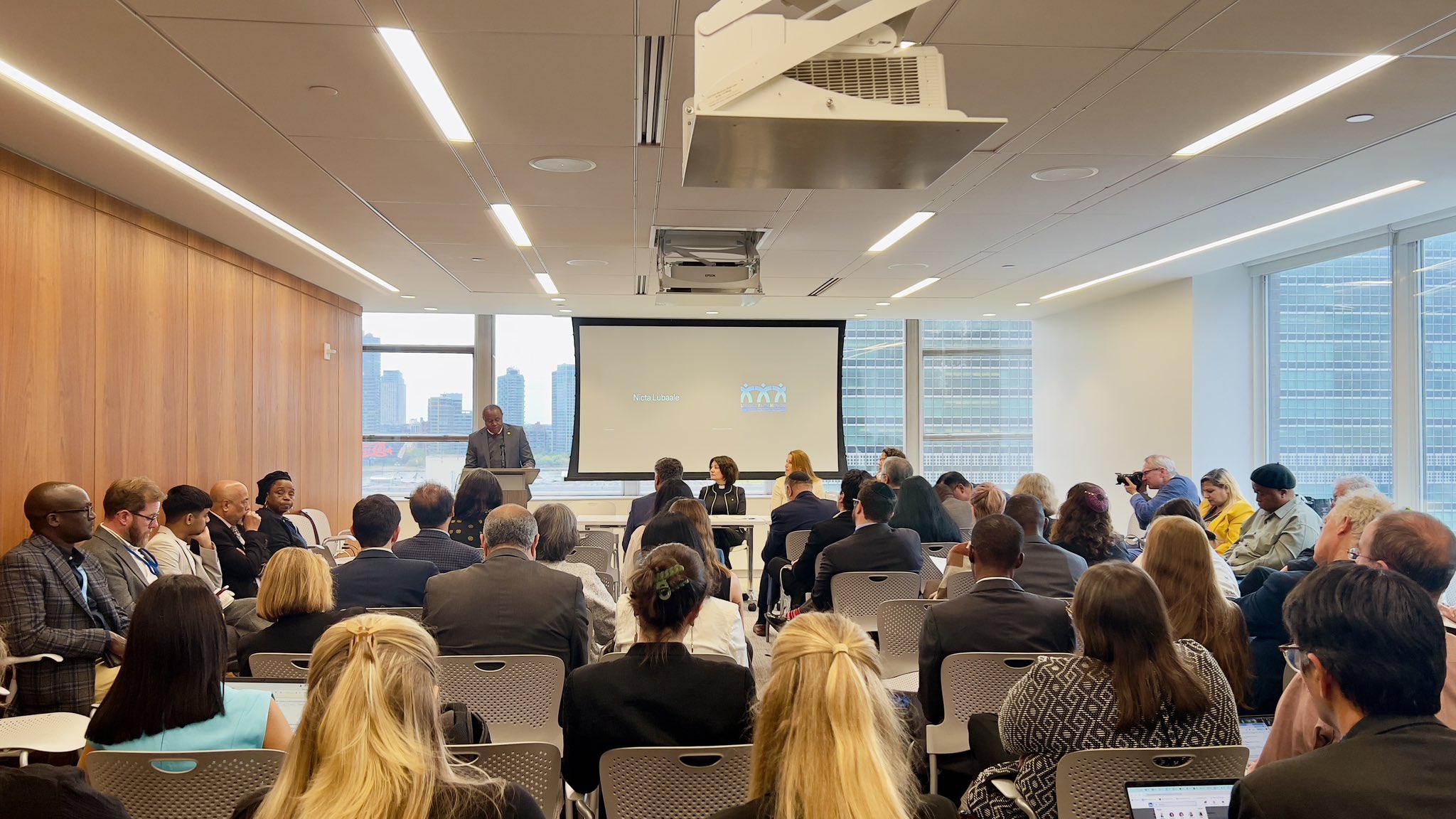
Secretary-General of Religions for Peace, Dr. Francis Kuria, providing opening remarks. Photo: Religions for Peace.
On Monday, September 23, the Peacemakers Network, alongside members including Religions for Peace (RfP), King Abdullah bin Abdulaziz Dialogue Centre (KAICIID), and the United Nations Development Programme (UNDP), participated in a consultation on the interreligious imperative for the Pact for the Future and multilateralism based on human fraternity.
The event featured three panels that showcased religious actors and youth leaders. Panelists responded to prompts on the multilateral base of human fraternity, interfaith insights for the Path for the Future, and inclusive intergenerational approaches to multilateralism through promoting stories that emphasize the sacredness of the life of all beings. Panel one emphasized that religious leaders should lead through action and tat action should be at the heart of everything they do. When giving her reflection on panel #2, Nika Saeedi of the UN Development Programme (UNDP), emphasized that religious organizations have six-thousand years of wisdom to teach the United Nations, calling for collaboration, not competition. She went on to state that, “It is difficult to constantly speak of the polarizing world without adding to the polarization.”
Following the third panel on inclusive intergenerational approaches to multilateralism, speakers concluded that we need to go beyond calling for the participation of youth, but go forward knowing that it’s not about participation, but about coming to the table with solutions.
Faith and the Future: What’s Next? High-Level Multi-Faith Reception
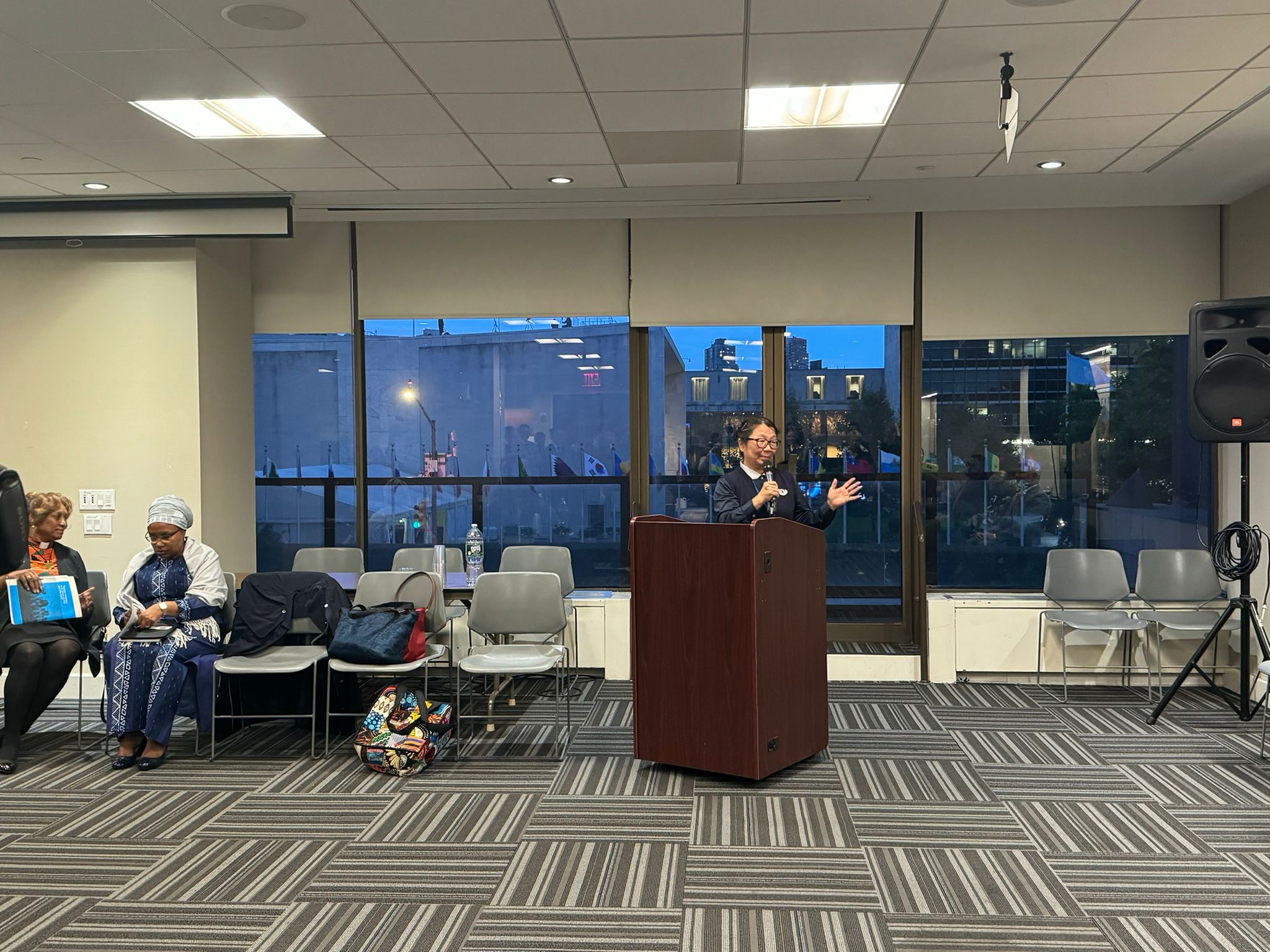
CEO of the Buddhist Tzu Chi Foundation and Co-chair of the Multi-Faith Advisory Council (MFAC), Debra Boudreaux, highlighted the work of the MFAC during the reception.
On Tuesday, September 24th, the Multi-Faith Advisory Council (MFAC), alongside a wide coalition of faith actors including members ACT Alliance, Lutheran World Federation, and the World Council of Churches, held a high-level multi-faith reception to engage in dialogue on faith commitments to realize the Pact for the Future. Peacemakers Network Executive Director Dr. Mohamed Elsanousi attended as Co-Chair of the MFAC, with the evening consisting of a series of short remarks, followed by space for critical conversations to foster connection and renewed dedication to multilateral cooperation in pursuit of the SDGs.
Follow the Network on social
